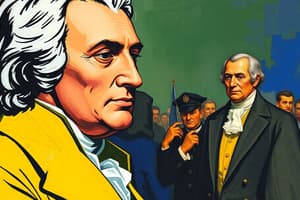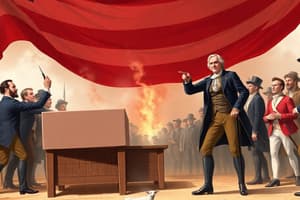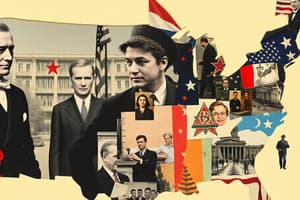Podcast
Questions and Answers
In what ways would the doctrine of nullification have made it difficult for the federal government to operate?
In what ways would the doctrine of nullification have made it difficult for the federal government to operate?
The doctrine of nullification said that states don't have to listen to what the federal government says if they deem it unconstitutional, making it hard for federal government to run because they could make a law and none of the states could follow it.
Which is the best description of John Quincy Adams' presidency?
Which is the best description of John Quincy Adams' presidency?
He accomplished very little.
Why did white settlers want Cherokee land?
Why did white settlers want Cherokee land?
To mine gold and grow cotton.
What did Jackson believe favored the wealthy?
What did Jackson believe favored the wealthy?
Based on its economic effects, was Jackson's decision to end the national bank a good one? Explain.
Based on its economic effects, was Jackson's decision to end the national bank a good one? Explain.
What was a positive aspect of the National Bank system?
What was a positive aspect of the National Bank system?
What strategy did the Whig Party use in the 1840 election?
What strategy did the Whig Party use in the 1840 election?
Why did southerners oppose tariffs?
Why did southerners oppose tariffs?
Why was the election of 1824 so controversial?
Why was the election of 1824 so controversial?
What was the Era of Good Feelings?
What was the Era of Good Feelings?
What was the spoils system?
What was the spoils system?
What was one factor that led to Jackson being elected president?
What was one factor that led to Jackson being elected president?
Who was the Whig candidate for president in the 1840 election who was a hero of the War of 1812 at the Battle of Tippecanoe?
Who was the Whig candidate for president in the 1840 election who was a hero of the War of 1812 at the Battle of Tippecanoe?
What is a political group made up of Andrew Jackson's political opponents that were able to put a president in place in the 1840 election?
What is a political group made up of Andrew Jackson's political opponents that were able to put a president in place in the 1840 election?
What is a long and severe recession in an economy or market called?
What is a long and severe recession in an economy or market called?
What event involved many people fearing the awful state of the economy and demanding their gold and silver in exchange for paper currency?
What event involved many people fearing the awful state of the economy and demanding their gold and silver in exchange for paper currency?
What is an increase in prices and a decrease in the value of money called?
What is an increase in prices and a decrease in the value of money called?
What does withdrawal from the Union refer to?
What does withdrawal from the Union refer to?
Who was the senator from Massachusetts that argued against nullification?
Who was the senator from Massachusetts that argued against nullification?
What was the argument between two beliefs on the issue of nullification for individual states called?
What was the argument between two beliefs on the issue of nullification for individual states called?
What is the belief that a state has the right to reject a federal law it considers unconstitutional?
What is the belief that a state has the right to reject a federal law it considers unconstitutional?
What was a tax on imported raw materials and manufactured goods that was passed during John Quincy Adams's presidency?
What was a tax on imported raw materials and manufactured goods that was passed during John Quincy Adams's presidency?
Who was a believer in stronger states' rights during the nullification debates who represented South Carolina in the Senate?
Who was a believer in stronger states' rights during the nullification debates who represented South Carolina in the Senate?
What was the outcome of the Seminoles' refusal?
What was the outcome of the Seminoles' refusal?
Why did Andrew Jackson support the Indian Removal Act?
Why did Andrew Jackson support the Indian Removal Act?
Why did Jackson's supporters react with such enthusiasm at his inauguration?
Why did Jackson's supporters react with such enthusiasm at his inauguration?
What were the characteristics of Jacksonian democracy?
What were the characteristics of Jacksonian democracy?
Flashcards are hidden until you start studying
Study Notes
Doctrine of Nullification
- States could reject federal laws deemed unconstitutional, undermining federal authority.
- Created potential for states to operate independently of national legislation.
John Quincy Adams' Presidency
- Characterized by minimal accomplishments and significant political challenges.
Cherokee Land Dispute
- White settlers sought Cherokee land primarily for gold mining and cotton cultivation.
Andrew Jackson's View on the National Bank
- Believed the National Bank favored the wealthy, which influenced his policies.
Economic Consequences of Ending the National Bank
- Led to economic turmoil, factory shutdowns, widespread panic, and overall negative outcomes.
Positive Aspects of the National Bank
- Provided a secure place for individuals and businesses to hold their money.
Whig Party's 1840 Election Strategy
- Employed propaganda to distinguish candidate William Henry Harrison, appealing to Jackson's discontented followers.
Southern Opposition to Tariffs
- Southerners argued that tariffs preferentially benefited Northern interests over Southern economies.
Controversy of the 1824 Election
- John Quincy Adams won despite receiving fewer electoral votes, leading to allegations of a "corrupt bargain."
Era of Good Feelings
- A period during James Monroe's presidency marked by relative national unity and minimal partisan conflict.
Spoils System
- Andrew Jackson's practice of appointing friends and political supporters to government positions.
Andrew Jackson's Popular Support
- Elected due to backing from the common people who identified with his populist image.
William Henry Harrison
- Whig candidate for president in 1840 and a War of 1812 hero, specifically noted for his role in the Battle of Tippecanoe.
Whig Party Formation
- Emerged as a political opposition to Andrew Jackson, successfully placing a president in the 1840 election.
Economic Slump Definition
- Depression refers to a lengthy and severe economic downturn.
Panic of 1837
- Economic crisis triggered by widespread bank failures as people rushed to exchange paper currency for gold and silver.
Inflation Definition
- Describes a situation characterized by rising prices and diminishing currency value.
Secession Definition
- The action of withdrawing from the Union, often associated with Southern states during the Civil War period.
Daniel Webster
- Massachusetts senator who argued against nullification, emphasizing national unity over state autonomy.
Webster-Hayne Debate
- A significant discussion addressing the conflicting views on states' rights and nullification.
Nullification Doctrine
- The principle that states could declare federal laws unconstitutional and refuse to enforce them.
Tariff of Abominations
- A controversial tax on imports enacted during Adams's presidency, heavily criticized by Southern states.
John C. Calhoun
- Advocated for stronger states' rights and represented South Carolina during nullification debates; served as Vice President.
Seminole Resistance
- Refusal by Seminoles to relocate, leading to the Second Seminole War as a result of their defiance.
Indian Removal Act Support
- Jackson supported the act, believing it would preserve Native American cultural practices.
Enthusiasm for Jackson's Inauguration
- Jackson's rise was seen as a victory for the average American, generating significant public excitement.
Characteristics of Jacksonian Democracy
- Emphasized democratic principles in social, economic, and political spheres, advocating for limited government and strong presidential power while supporting farmers and laborers.
Studying That Suits You
Use AI to generate personalized quizzes and flashcards to suit your learning preferences.




